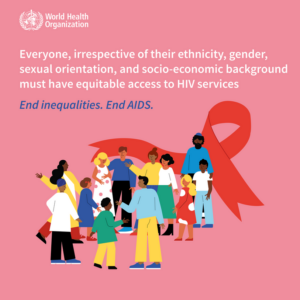
Today marks the annual World AIDS Day, promoted by the World Health Organization (WHO) since 1987. The theme for this year’s awareness day is “End inequalities. End AIDS.”
Apart from COVID-19, HIV/AIDS remains the only other ongoing pandemic affecting the world today. In stark contrast to COVID-19, HIV vaccines largely remain in development, though advances in mRNA vaccine technology may assist progress.
Though HIV treatments have been available for over 25 years now, a recent report from the WHO notes that HIV resistance to these treatments is rising in many highly-affected countries. A positive contrast is that the number of countries reaching the targets for HIV suppression is increasing. However, more efforts are needed to achieve the UNAIDS targets for 2025, which are:
- 95% of people living with HIV know their HIV status
- 95% of people living with HIV initiate treatment
- 95% of those on treatment are virally suppressed (virus is not detectable)
- 95% coverage of services eliminating vertical transmission (from mother to baby)
- 95% of women access HIV and sexual and reproductive health services
—
In the past year, BMJ Open has published a number of studies on HIV/AIDS that have already attracted attention in the press and social media.
A qualitative study in Uganda of the participants and research team in an ongoing clinical trial revealed the impact of COVID-19 on the progress of the trial. Participants described fear of COVID-19 infection, difficulties accessing treatment facilities, and interrupted HIV treatment schedules. Some participants also received incorrect information, such as being told they are at higher risk of COVID-19 if receiving treatment for HIV. The authors of the study recommend that national research regulators and ethics committees should develop policies and guidelines for the continuity of research and clinical trials in the event of future, similar shocks.
A review of HIV testing policies in Africa found that access to HIV testing may be hampered by lack of clarity in ages of consent. This presents problems if adolescents are unable to access testing services without parental consent, when they are unwilling to disclose their sexual or other risk behaviours to their parents.
A cross-sectional study from Senegal showed that the health coverage system remains limited in its effectiveness in covering people living with HIV. Out-of-pocket expenses remain high for those seeking care, often equivalent to several days’ worth of living expenses.
Another study reported that one fifth of people living with HIV in rural Zimbabwe are affected by common mental disorders, such as depression or anxiety, highlighting the need to integrate mental health services in HIV treatment programmes.
People living with HIV are often concurrently affected by other health conditions, which can present additional problems. A cohort study in Uganda and Tanzania showed that integrated care of HIV, diabetes, and hypertension is a feasible strategy for patients that are affected by multimorbidity. A companion scoping review to this cohort study described mostly positive patient perspectives and experiences on integrated care for these conditions. It was found that integrated care can be associated with reduced HIV-related stigma, reduced travel and treatment costs, and a more holistic person-centred care.
A cohort study from British Columbia, Canada reminds us that HIV/AIDS remains a public health issue worldwide, not just in low- and middle-income countries. In this study, the authors showed that people living with HIV had a higher prevalence of most chronic age-associated comorbidities than their HIV-negative peers, such as Alzheimer’s disease, cardiovascular disease, kidney and liver diseases. This underscores the need for further primary care guidelines for people living with HIV, to improve management of chronic diseases in this population.
Finally, an interesting scoping review on patient-generated data revealed a rising area of care that is worth exploring further in the context of HIV. In this context, patient-generated data relates to “any health-related data which are created or collected by patients or designated proxies to address a health concern,” typically through digital platforms, eg. smartphone apps. Such platforms may provide convenience and improve patient proactivity towards their healthcare. However, issues do remain, such as concerns about digital access inequalities, data privacy, and data security.
You can read more in our BMJ Open’s full HIV/AIDS collection.
—
While the HIV/AIDS pandemic is a long way from being over, we hope that the importance of progress in this field will not be forgotten.
Take part in the World AIDS Day campaign on social media: #WorldAIDSDay #EndAIDS #EndInequalities #RockTheRibbon
Got a favourite BMJ Open paper on HIV/AIDS? Tag us on Twitter with @BMJ_Open to let us know!